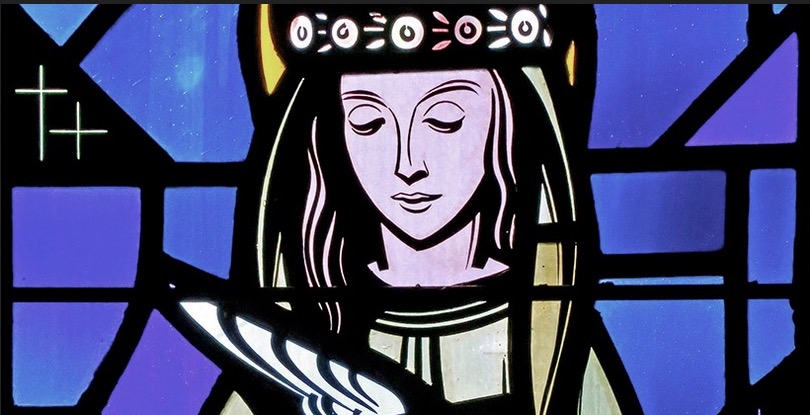Perhaps one of the first miracles attributed to St. Maria Goretti is what speaks most of her character. Nearly six years after her violent murder by Alessandro Serenelli, she appeared to him in his jail cell. She had forgiven him as she lay dying in 1902, after he stabbed her to death for refusing his sexual advances. But here, serving a 30-year imprisonment for his crime, Serenelli found great peace and consolation in the mercy shown by his young victim as he heard her forgive him yet again. Even after her death, St. Maria Goretti provides a heroic example of what it means to forgive.
Although only 11 at the time of her death, young Maria’s wisdom and spiritual depth were more developed than most. Typically, children who lose a parent early in life mature quickly and develop strength beyond their years, and Maria was no exception, her father having died when she was 9.
Poor finances forced Maria’s family to share a home with the Serenelli family, but their poverty was no blockade to young Maria’s happiness. While her mother and siblings worked in the fields, Maria did the household chores — like cooking and sewing — meanwhile taking care of her baby sister. She embraced whatever work she had to do around the house, no doubt performing countless chores without any recognition in return. A year before she died, Maria received her first Communion, possibly the most joyful day of her young life.
During one of these days of everyday chores, Maria fought off Alessandro’s attempt to rape her. Dark forces clouded Alessandro’s judgment — persuaded to immorality by pornographic publications — and he decided to kill Maria if she refused his advances as she had done previously. She defended her God-given purity resolutely, risking death rather than allowing sin, shouting, “No! It is a sin! God does not want it!” But Alessandro didn’t relent and stabbed her 14 times in retaliation.
Maria was brought to hospital where doctors tried to save her. She lasted some 20 hours, during which time she taught us all the lesson of forgiveness — praying for and forgiving her attacker from her deathbed. Nourished by the last sacraments of the Church, Maria died on July 6, 1902, as she looked upon a picture of the Blessed Mother.
The faith she lived and learned in her family — not formal education — is the foundation for the strength, maturity and heroic virtue with which she defended herself and forgave Alessandro. Six years after her death, as she appeared to him in his jail cell, Maria handed him 14 white lilies — a supernatural expression of forgiveness and love that led not only to Alessandro’s contrition but also to his conversion. Up to his dying day, he credited her for his redemption, often saying, “Maria’s forgiveness saved me.”
St. Maria Goretti died for love of God and hatred of evil. She lived an ordinary life, yet her faith and love for God were extraordinary. Maria was declared a martyr and, in her mother’s presence, Venerable Pope Pius XII canonized Maria in 1950.
At her canonization, the pope said that while we are not all called to be martyrs, Maria’s witness reminds us all that “we are all called to the pursuit of Christian virtue … a constant, persistent and relentless effort … right up to the moment of our death. This may be conceived as a slow, steady martyrdom which Christ urged upon us when he said: The kingdom of heaven is set upon and laid waste by violent forces.”
Her feast day is July 6.
Michael R. Heinlein is editor of Simply Catholic.

